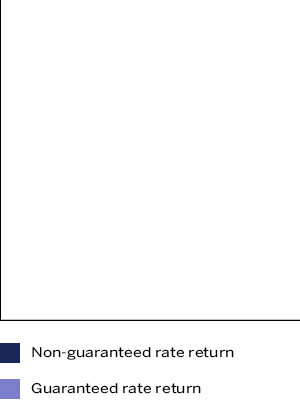Your TFSA: More than just a savings account
TFSAs are a very popular savings vehicle. Did you know that you can invest in a variety of savings products in your TFSA and take advantage of tax-free investment income? Here's an overview.
A tax-free savings account (TFSA) is a savings account. The funds you place in a TFSA can be invested in different types of products. What's more, the investment income generated by these products, within a TFSA, is not taxable. Do you know how the funds in your TFSA are invested? If you opened a TFSA account a few years ago, or if you're thinking about opening one in the near future, keep in mind that there are several possibilities beyond just an ordinary savings account.
To ensure you reach your goals, it may be time to review your savings strategy. Here are three frequently asked questions that can help you make the best decision for your situation and goals.
What is tax-free investment income?
A TFSA is a highly flexible savings instrument that you can use to generate non-taxable income through the savings products that you have within it. It allows you to set and achieve short-, medium-, and long-term goals, such as taking a trip, coming up with a down payment for a car, renovating your home, or increasing your retirement income.
In concrete terms, this means that if you've contributed $1,000 to a guaranteed investment certificate (GIC) that you put in your TFSA, at an annual rate of return of 2 percent, at the end of the year, you'll earn $20, which won't be considered taxable income.
Any withdrawals you make from your TFSA are not taxable, since the money you save comes out of your net salary.
Do you know what's in your TFSA?
When opening their first TFSA, some people opt for a regular savings account. Generally speaking, this is a bank account where your money can grow, but at a lower rate—typically 3% to 5% since interest rates began to rise at the end of 2022. The income potential with this type of investment is fairly low.
If your investment income is below inflation, it means you won't be earning enough money to keep up with the rising cost of living. By investing in other products that have the potential to earn higher, tax-free returns, you could get more value for your money.

The diagram illustrates the capital accumulated over 5 years for a guaranteed and a non-guaranteed savings product. The simulation is based on a $1,000 investment in a savings account with a 0.80% annual rate of return and in the RRSP+ at the Fonds based on the value of Class A shares between 2016 and 2020.
Keep in mind, however, that, in general, the higher the potential for return, the greater the risk. Take the time to assess your risk tolerance based on your investor profile.
What investment products should you put in your TFSA?
Versatile like an RRSP, a TFSA, which is a savings vehicle and not a product, lets you invest in a wide variety of financial products, such as mutual funds, GICs, stocks, and bonds. You can choose whatever works for you based on your needs and savings goals! Here are the main features of the different products available.
Mutual funds
Mutual funds are managed by fund managers, whereas their assets are managed by portfolio managers. Fund managers invest all of their investors' combined capital in investment products that meet the fund's objectives, according to the investment policies set by the fund managers.
To achieve the chosen goal, there are different mutual funds: fixed income, balanced, equity, international, and money market. The return, and therefore the risk, depend on the investments made. With FlexiFonds, the Fonds de solidarité FTQ offers three investment profiles: Conservative, Balanced, and Growth, all of which correspond to specific investor profiles.
Mutual funds don't have a maturity date and may generate returns in the form of dividends, interest, capital gains, etc. They can be redeemed at any time, and their units are not guaranteed.
Guaranteed investment certificates (GICs) and bonds
GICs
GICs are debt securities issued by financial institutions, to whom you lend money through these securities. In exchange for this loan, you receive interest. The interest rate is fixed from the time of your investment to when it matures.
Generally, GICs cannot be withdrawn early and need to be held until maturity, which can vary between one and five years, on average. There are a few exceptions, but expect there to be penalties if you withdraw your GICs early.
Your money is safe since the amounts invested are generally guaranteed by the issuer and your capital is insured by a deposit protection plan, under certain conditions, in the event that the issuer goes bankrupt.
Bonds
Like GICs, with bonds, you lend your money to an issuer—a company or a government—which, in return, pays you fixed interest on a regular basis. On the maturity date, in one to 30 years, the issuer must repay you the full face value of the bond.
The value of the bond varies according to interest rates, but also according to the issuer's credit assessment.
Held until maturity, the bond entitles you to receive the interest set at the time of purchase, unless the issuer is no longer able to meet its obligations.
Stocks
When you buy stocks, you own a portion of the capital of the company that issued them. There is no maturity date for stocks, which can generate a return in the form of dividends or capital income. They are traded on the stock market or over-the-counter markets.
The risk, like the return outlook, is high with stocks, as their value can rise or fall considerably. If the company has dissolved, you will be entitled to a portion of the remaining assets, but only after all other creditors have been paid off. In addition, preferred stockholders have priority over common stockholders.
A TFSA is a savings vehicle that offers many possibilities that are much more appealing than the idea of keeping your savings in a simple savings account! If it's been several years since you opened a TFSA, it may be time to check with your financial institution to see what types of products you've invested in. By making the right choices based on your investor profile and goals, you can optimize your returns and generate earnings over the long term. You can have several TFSAs for different purposes, as long as you do not exceed your annual contribution room. You might want to get a second opinion on your investments to ensure you're getting the most out of each one, with the help of FlexiFonds, for example.
Keep your savings local

The TFSA with FlexiFonds products not only helps you save for important projects, but also allows you to support the Québec economy thanks to mutual funds that invest primarily here.
DISCOVER THE TFSA WITH FLEXIFONDSAbout FlexiFonds de solidarité FTQ
FlexiFonds de solidarité FTQ inc., a wholly owned subsidiary of the Fonds de solidarité FTQ, is a mutual fund dealer duly registered with the Autorité des marchés financiers. FlexiFonds de solidarité inc. acts as the principal distributor of the FlexiFonds funds and does not distribute the units of any other mutual fund.



